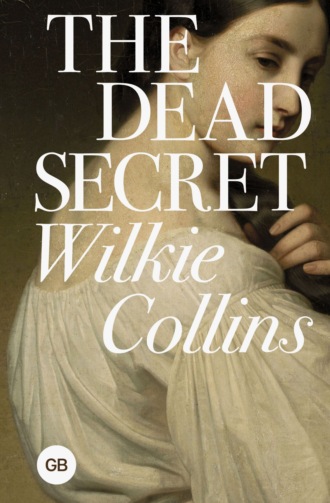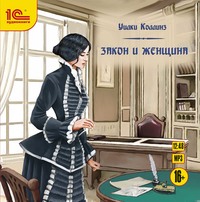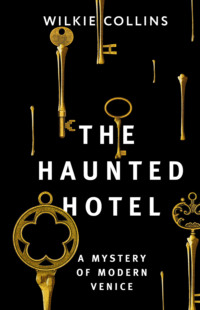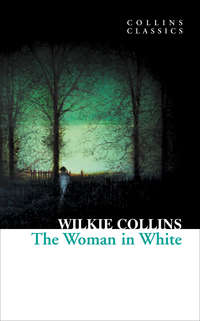
Полная версия
The Dead Secret / Тайна
“Lenny, you are very silent this morning,” she said. “What are you thinking about? If you will tell me all your thoughts, I will tell you all mine.”
“Would you really care to hear all my thoughts?” asked Leonard.
“Yes; all. I shall be jealous of any thoughts that you keep to yourself. Tell me what you were thinking of just now! Me?”
“Not exactly of you.”
“More shame for you. Are you tired of me in eight days? I have not thought of any body but you ever since we have been here. Ah! you laugh. Oh, Lenny, I do love you so; how can I think of any body but you? No! I sha'n't kiss you. I want to know what you were thinking about first.”
“Of a dream, Rosamond, that I had last night. Ever since the first days of my blindness – Why, I thought you were not going to kiss me again till I had told you what I was thinking about!”
“I can't help kissing you, Lenny, when you talk of the loss of your sight. Tell me, my poor love, do I help to make up for that loss? Are you happier than you used to be? and have I some share in making that happiness, though it is ever so little?”
She turned her head away as she spoke, but Leonard was too quick for her. His inquiring fingers touched her cheek. “Rosamond, you are crying,” he said.
“I crying!” she answered, with a sudden assumption of gayety. “No,” she continued, after a moment's pause. “I will never deceive you, love, even in the veriest trifle. My eyes serve for both of us now, don't they? you depend on me for all that your touch fails to tell you, and I must never be unworthy of my trust – must I? I did cry, Lenny – but only a very little. I don't know how it was, but I never, in all my life, seemed to pity you and feel for you as I did just at that moment. Never mind, I've done now. Go on – do go on with what you were going to say.”
“I was going to say, Rosamond, that I have observed one curious thing about myself since I lost my sight. I dream a great deal, but I never dream of myself as a blind man. I often visit in my dreams places that I saw and people whom I knew when I had my sight, and though I feel as much myself, at those visionary times, as I am now when I am wide-awake, never by any chance feel blind. I wander about all sorts of old walks in my sleep, and never grope my way. I talk to all sorts of old friends in my sleep, and see the expression in their faces which, waking, I shall never see again. I have lost my sight more than a year now, and yet it was like the shock of a new discovery to me to wake up last night from my dream, and remember suddenly that I was blind.”
“What dream was it, Lenny?”
“Only a dream of the place where I first met you when we were both children. I saw the glen, as it was years ago, with the great twisted roots of the trees, and the blackberry bushes twining about them in a still shadowed light that came through thick leaves from the rainy sky. I saw the mud on the walk in the middle of the glen, with the marks of the cows' hoofs in some places, and the sharp circles in others where some countrywomen had been lately trudging by on pattens. I saw the muddy water running down on either side of the path after the shower; and I saw you, Rosamond, a naughty girl, all covered with clay and wet – just as you were in the reality – soiling your bright blue pelisse and your pretty little chubby hands by making a dam to stop the running water, and laughing at the indignation of your nurse-maid when she tried to pull you away and take you home. I saw all that exactly as it really was in the by-gone time; but, strangely enough, I did not see myself as the boy I then was. You were a little girl, and the glen was in its old neglected state, and yet, though I was all in the past so far, I was in the present as regarded myself. Throughout the whole dream I was uneasily conscious of being a grown man – of being, in short, exactly what I am now, excepting always that I was not blind.”
“What a memory you must have, love, to be able to recall all those little circumstances after the years that have passed since that wet day in the glen! How well you recollect what I was as a child! Do you remember in the same vivid way what I looked like a year ago when you saw me – Oh, Lenny, it almost breaks my heart to think of it! – when you saw me for the last time?”
“Do I remember, Rosamond! My last look at your face has painted your portrait in my memory in colors that can never change. I have many pictures in my mind, but your picture is the clearest and brightest of all.”
“And it is the picture of me at my best – painted in my youth, dear, when my face was always confessing how I loved you, though my lips said nothing. There is some consolation in that thought. When years have passed over us both, Lenny, and when time begins to set his mark on me, you will not say to yourself, 'My Rosamond is beginning to fade; she grows less and less like what she was when I married her.' I shall never grow old, love, for you! The bright young picture in your mind will still be my picture when my cheeks are wrinkled and my hair is gray.”
“Still your picture – always the same, grow as old as I may.”
“But are you sure it is clear in every part? Are there no doubtful lines, no unfinished corners any where? I have not altered yet since you saw me – I am just what I was a year ago. Suppose I ask you what I am like now, could you tell me without making a mistake?”
“Try me.”
“May I? You shall be put through a complete catechism! I don't tire you sitting on your knee, do I? Well, in the first place, how tall am I when we both stand up side by side?”
“You just reach to my ear.”
“Quite right, to begin with. Now for the next question. What does my hair look like in your portrait?”
“It is dark brown – there is a great deal of it – and it grows rather too low on your forehead for the taste of some people —”
“Never mind about 'some people;' does it grow too low for your taste?”
“Certainly not. I like it to grow low; I like all those little natural waves that it makes against your forehead; I like it taken back, as you wear it, in plain bands, which leave your ears and your cheeks visible; and above all things, I like that big glossy knot that it makes where it is all gathered up together at the back of your head.”
“Oh, Lenny, how well you remember me, so far! Now go a little lower.”
“A little lower is down to your eyebrows. They are very nicely shaped eyebrows in my picture —”
“Yes, but they have a fault. Come! tell me what the fault is.”
“They are not quite so strongly marked as they might be.”
“Right again! And my eyes?”
“Brown eyes, large eyes, wakeful eyes, that are always looking about them. Eyes that can be very soft at one time, and very bright at another. Eyes tender and clear, just at the present moment, but capable, on very slight provocation, of opening rather too widely, and looking rather too brilliantly resolute.”
“Mind you don't make them look so now! What is there below the eyes?”
“A nose that is not quite big enough to be in proper proportion with them. A nose that has a slight tendency to be —”
“Don't say the horrid English word! Spare my feelings by putting it in French. Say retroussé, and skip over my nose as fast as possible.”
“I must stop at the mouth, then, and own that it is as near perfection as possible. The lips are lovely in shape, fresh in color, and irresistible in expression. They smile in my portrait, and I am sure they are smiling at me now.”
“How could they do otherwise when they are getting so much praise? My vanity whispers to me that I had better stop the catechism here. If I talk about my complexion, I shall only hear that it is of the dusky sort; and that there is never red enough in it except when I am walking, or confused, or angry. If I ask a question about my figure, I shall receive the dreadful answer, 'You are dangerously inclined to be fat.' If I say, How do I dress? I shall be told, Not soberly enough; you are as fond as a child of gay colors – No! I will venture no more questions. But, vanity apart, Lenny, I am so glad, so proud, so happy to find that you can keep the image of me clearly in your mind. I shall do my best now to look and dress like your last remembrance of me. My love of loves! I will do you credit – I will try if I can't make you envied for your wife. You deserve a hundred thousand kisses for saying your catechism so well – and there they are!”
While Mrs. Frankland was conferring the reward of merit on her husband, the sound of a faint, small, courteously significant cough made itself timidly audible in a corner of the room. Turning round instantly, with the quickness that characterized all her actions, Mrs. Frankland, to her horror and indignation, confronted Miss Mowlem standing just inside the door, with a letter in her hand and a blush of sentimental agitation on her simpering face.
“You wretch! how dare you come in without knocking at the door?” cried Rosamond, starting to her feet with a stamp, and passing in an instant from the height of fondness to the height of indignation.
Miss Mowlem shook guiltily before the bright, angry eyes that looked through and through her, turned very pale, held out the letter apologetically, and said in her meekest tones that she was very sorry.
“Sorry!” exclaimed Rosamond, getting even more irritated by the apology than she had been by the intrusion, and showing it by another stamp of the foot; “who cares whether you are sorry? I don't want your sorrow – I won't have it. I never was so insulted in my life – never, you mean, prying, inquisitive creature!”
“Rosamond! Rosamond! pray don't forget yourself!” interposed the quiet voice of Mr. Frankland.
“Lenny, dear, I can't help it! That creature would drive a saint mad. She has been prying after us ever since we have been here – you have, you ill-bred, indelicate woman! – I suspected it before – I am certain of it now! Must we lock our doors to keep you out? – we won't lock our doors! Fetch the bill! We give you warning. Mr. Frankland gives you warning – don't you, Lenny? I'll pack up all your things, dear: she sha'n't touch one of them. Go down stairs and make out your bill, and give your mother warning. Mr. Frankland says he won't have his rooms burst into, and his doors listened at by inquisitive women – and I say so too. Put that letter down on the table – unless you want to open it and read it – put it down, you audacious woman, and fetch the bill, and tell your mother we are going to leave the house directly!”
At this dreadful threat, Miss Mowlem, who was soft and timid, as well as curious, by nature, wrung her hands in despair, and overflowed meekly in a shower of tears.
“Oh! good gracious Heavens above!” cried Miss Mowlem, addressing herself distractedly to the ceiling, “what will mother say! whatever will become of me now! Oh, ma'am! I thought I knocked – I did, indeed! Oh, ma'am! I humbly beg pardon, and I'll never intrude again. Oh, ma'am! mother's a widow, and this is the first time we have let the lodgings, and the furniture's swallowed up all our money, and oh, ma'am! ma'am! how I shall catch it if you go!” Here words failed Miss Mowlem, and hysterical sobs pathetically supplied their place.
“Rosamond!” said Mr. Frankland. There was an accent of sorrow in his voice this time, as well as an accent of remonstrance. Rosamond's quick ear caught the alteration in his tone. As she looked round at him her color changed, her head drooped a little, and her whole expression altered on the instant. She stole gently to her husband's side with softened, saddened eyes, and put her lips caressingly close to his ear.
“Lenny,” she whispered, “have I made you angry with me?”
“I can't be angry with you, Rosamond,” was the quiet answer. “I only wish, love, that you could have controlled yourself a little sooner.”
“I am so sorry – so very, very sorry!” The fresh, soft lips came closer still to his ear as they whispered these penitent words; and the cunning little hand crept up tremblingly round his neck and began to play with his hair. “So sorry, and so ashamed of myself! But it was enough to make almost any body angry, just at first – wasn't it, dear? And you will forgive me – won't you, Lenny? – if I promise never to behave so badly again? Never mind that wretched whimpering fool at the door,” said Rosamond, undergoing a slight relapse as she looked round at Miss Mowlem, standing immovably repentant against the wall, with her face buried in a dingy-white pocket-handkerchief. “I'll make it up with her; I'll stop her crying; I'll take her out of the room; I'll do any thing in the world that's kind to her, if you will only forgive me.”
“A polite word or two is all that is wanted – nothing more than a polite word or two,” said Mr. Frankland, rather coldly and constrainedly.
“Don't cry any more, for goodness sake!” said Rosamond, walking straight up to Miss Mowlem, and pulling the dingy-white pocket-handkerchief away from her face without the least ceremony. “There! leave off, will you? I am very sorry I was in a passion – though you had no business to come in without knocking – I never meant to distress you, and I'll never say a hard word to you again, if you will only knock at the door for the future, and leave off crying now. Do leave off crying, you tiresome creature! We are not going away. We don't want your mother, or the bill, or any thing. Here! here's a present for you, if you'll leave off crying. Here's my neck-ribbon – I saw you trying it on yesterday afternoon, when I was lying down on the bedroom sofa, and you thought I was asleep. Never mind; I'm not angry about that. Take the ribbon – take it as a peace-offering, if you won't as a present. You shall take it! – No, I don't mean that – I mean, please take it! There, I've pinned it on. And now, shake hands and be friends, and go up stairs and see how it looks in the glass.” With these words, Mrs. Frankland opened the door, administered, under the pretense of a pat on the shoulder, a good-humored shove to the amazed and embarrassed Miss Mowlem, closed the door again, and resumed her place in a moment on her husband's knee.
“I've made it up with her, dear. I've sent her away with my bright green ribbon, and it makes her look as yellow as a guinea, and as ugly as —” Rosamond stopped, and looked anxiously into Mr. Frankland's face. “Lenny!” she said, sadly, putting her cheek against his, “are you angry with me still?”
“My love, I was never angry with you. I never can be.”
“I will always keep my temper down for the future, Lenny!”
“I am sure you will, Rosamond. But never mind that. I am not thinking of your temper now.”
“Of what, then?”
“Of the apology you made to Miss Mowlem.”
“Did I not say enough? I'll call her back if you like – I'll make another penitent speech – I'll do any thing but kiss her. I really can't do that – I can't kiss any body now but you.”
“My dear, dear love, how very much like a child you are still in some of your ways! You said more than enough to Miss Mowlem – far more. And if you will pardon me for making the remark, I think in your generosity and good-nature you a little forgot yourself with the young woman. I don't so much allude to your giving her the ribbon – though, perhaps, that might have been done a little less familiarly – but, from what I heard you say, I infer that you actually went the length of shaking hands with her.”
“Was that wrong? I thought it was the kindest way of making it up.”
“My dear, it is an excellent way of making it up between equals. But consider the difference between your station in society and Miss Mowlem's.”
“I will try and consider it, if you wish me, love. But I think I take after my father, who never troubles his head (dear old man!) about differences of station. I can't help liking people who are kind to me, without thinking whether they are above my rank or below it; and when I got cool, I must confess I felt just as vexed with myself for frightening and distressing that unlucky Miss Mowlem as if her station had been equal to mine. I will try to think as you do, Lenny; but I am very much afraid that I have got, without knowing exactly how, to be what the newspapers call a Radical.”
“My dear Rosamond! don't talk of yourself in that way, even in joke. You ought to be the last person in the world to confuse those distinctions in rank on which the whole well-being of society depends.”
“Does it really? And yet, dear, we don't seem to have been created with such very wide distinctions between us. We have all got the same number of arms and legs; we are all hungry and thirsty, and hot in the summer and cold in the winter; we all laugh when we are pleased, and cry when we are distressed; and, surely, we have all got very much the same feelings, whether we are high or whether we are low. I could not have loved you better, Lenny, than I do now if I had been a duchess, or less than I do now if I had been a servant-girl.”
“My love, you are not a servant-girl. And, as to what you say about being a duchess, let me remind you that you are not so much below a duchess as you seem to think. Many a lady of high title can not look back on such a line of ancestors as yours. Your father's family, Rosamond, is one of the oldest in England: even my father's family hardly dates back so far; and we were landed gentry when many a name in the peerage was not heard of. It is really almost laughably absurd to hear you talking of yourself as a Radical.”
“I won't talk of myself so again, Lenny – only don't look so serious. I will be a Tory, dear, if you will give me a kiss, and let me sit on your knee a little longer.”
Mr. Frankland's gravity was not proof against his wife's change of political principles, and the conditions which she annexed to it. His face cleared up, and he laughed almost as gayly as Rosamond herself.
“By the bye,” he said, after an interval of silence had given him time to collect his thoughts, “did I not hear you tell Miss Mowlem to put a letter down on the table? Is it a letter for you or for me?”
“Ah! I forgot all about the letter,” said Rosamond, running to the table. “It is for you, Lenny – and, goodness me! here's the Porthgenna postmark on it.”
“It must be from the builder whom I sent down to the old house about the repairs. Lend me your eyes, love, and let us hear what he says.”
Rosamond opened the letter, drew a stool to her husband's feet, and, sitting down with her arms on his knees, read as follows:
“To Leonard Frankland, Esq.:
“Sir, – Agreeably to the instructions with which you favored me, I have proceeded to survey Porthgenna Tower, with a view to ascertaining what repairs the house in general, and the north side of it in particular, may stand in need of.
“As regards the outside, a little cleaning and new pointing is all that the building wants. The walls and foundations seem made to last forever. Such strong, solid work I never set eyes on before.
“Inside the house, I can not report so favorably. The rooms in the west front, having been inhabited during the period of Captain Treverton's occupation, and having been well looked after since, are in tolerably sound condition. I should say two hundred pounds would cover the expense of all repairs in my line which these rooms need. This sum would not include the restoration of the western staircase, which has given a little in some places, and the banisters of which are decidedly insecure from the first to the second landing. From twenty-five to thirty pounds would suffice to set this all right.
“In the rooms on the north front, the state of dilapidation, from top to bottom, is as bad as can be. From all that I could ascertain, nobody ever went near these rooms in Captain Treverton's time, or has ever entered them since. The people who now keep the house have a superstitious dread of opening any of the north doors, in consequence of the time that has elapsed since any living being has passed through them. Nobody would volunteer to accompany me in my survey, and nobody could tell me which keys fitted which room doors in any part of the north side. I could find no plan containing the names or numbers of the rooms; nor, to my surprise, were there any labels attached separately to the keys. They were given to me, all hanging together on a large ring, with an ivory label on it, which was only marked – Keys of the North Rooms. I take the liberty of mentioning these particulars in order to account for my having, as you might think, delayed my stay at Porthgenna Tower longer than is needful. I lost nearly a whole day in taking the keys off the ring, and fitting them at hazard to the right doors. And I occupied some hours of another day in marking each door with a number on the outside, and putting a corresponding label to each key, before I replaced it on the ring, in order to prevent the possibility of future errors and delays.
“As I hope to furnish you, in a few days, with a detailed estimate of the repairs needed in the north part of the house, from basement to roof, I need only say here that they will occupy some time, and will be of the most extensive nature. The beams of the staircase and the flooring of the first story have got the dry rot. The damp in some rooms, and the rats in others, have almost destroyed the wainscotings. Four of the mantel-pieces have given out from the walls, and all the ceilings are either stained, cracked, or peeled away in large patches. The flooring is, in general, in a better condition than I had anticipated; but the shutters and window-sashes are so warped as to be useless. It is only fair to acknowledge that the expense of setting all these things to rights – that is to say, of making the rooms safe and habitable, and of putting them in proper condition for the upholsterer – will be considerable. I would respectfully suggest, in the event of your feeling any surprise or dissatisfaction at the amount of my estimate, that you should name a friend in whom you place confidence, to go over the north rooms with me, keeping my estimate in his hand. I will undertake to prove, if needful, the necessity of each separate repair, and the justice of each separate charge for the same, to the satisfaction of any competent and impartial person whom you may please to select.
“Trusting to send you the estimate in a few days, “I remain, Sir, “Your humble servant, “Thomas Horlock.”
“A very honest, straightforward letter,” said Mr. Frankland.
“I wish he had sent the estimate with it,” said Rosamond. “Why could not the provoking man tell us at once in round numbers what the repairs will really cost?”
“I suspect, my dear, he was afraid of shocking us, if he mentioned the amount in round numbers.”
“That horrid money! It is always getting in one's way, and upsetting one's plans. If we haven't got enough, let us go and borrow of somebody who has. Do you mean to dispatch a friend to Porthgenna to go over the house with Mr. Horlock? If you do, I know who I wish you would send.”
“Who?”
“Me, if you please – under your escort, of course. Don't laugh, Lenny; I would be very sharp with Mr. Horlock; I would object to every one of his charges, and beat him down without mercy. I once saw a surveyor go over a house, and I know exactly what to do. You stamp on the floor, and knock at the walls, and scrape at the brick-work, and look up all the chimneys, and out of all the windows – sometimes you make notes in a little book, sometimes you measure with a foot-rule, sometimes you sit down all of a sudden, and think profoundly – and the end of it is that you say the house will do very well indeed, if the tenant will pull out his purse, and put it in proper repair.”
“Well done, Rosamond! You have one more accomplishment than I knew of; and I suppose I have no choice now but to give you an opportunity of displaying it. If you don't object, my dear, to being associated with a professional assistant in the important business of checking Mr. Horlock's estimate, I don't object to paying a short visit to Porthgenna whenever you please – especially now I know that the west rooms are still habitable.”
“Oh, how kind of you! how pleased I shall be! how I shall enjoy seeing the old place again before it is altered! I was only five years old, Lenny, when we left Porthgenna, and I am so anxious to see what I can remember of it, after such a long, long absence as mine. Do you know, I never saw any thing of that ruinous north side of the house? – and I do so dote on old rooms! We will go all through them, Lenny. You shall have hold of my hand, and look with my eyes, and make as many discoveries as I do. I prophesy that we shall see ghosts, and find treasures, and hear mysterious noises – and, oh heavens! what clouds of dust we shall have to go through. Pouf! the very anticipation of them chokes me already.”














